
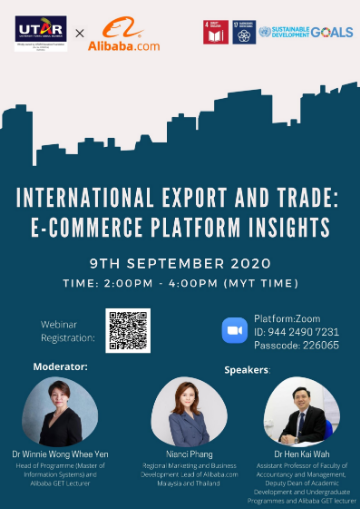
The webinar poster
The e-commerce
industry has been blooming over the past few years, especially after the
digitalisation of most industries in the world. Now more than ever, due to
the Covid-19 pandemic that has affected most, if not all businesses’
physical activities around the world, they have directed their attention to
e-commerce to maintain their operations. Thus, to educate
UTAR students and
staff on the importance of e-commerce principally for the current climate,
UTAR Division of Community and International Networking (DCInterNet)
collaborated with Alibaba Group to hold a webinar titled “International
Export and Trade: E-Commerce Platform Insights” on 9 September 2020 via
Zoom.
Speaking at the
webinar were none other than Regional Marketing and Business Development
Lead of Alibaba Malaysia Malaysia and Thailand Nianci Phang and UTAR Faculty
of Accountancy and Management (FAM) Deputy Dean for Academic Development and
Undergraduate Programmes Dr Hen Kai Wah. On the other hand, the moderator of
the webinar was the UTAR Lee Kong Chian Faculty of Engineering and Science
(LKC FES) Head of Programme for Master of Information Systems Dr Wong Whee
Yen. The webinar mainly aimed to enlighten the participants on the current
situation of the e-commerce business in Malaysia and also how
Alibaba has helped small and medium enterprises to grow their business on
e-commerce platforms.
After Dr Wong
initiated the talk, Nianci Phang took the virtual stage by focusing on three
main topics in her presentation; Alibaba’s digital evolution throughout the
years, the impact of Covid-19 on online business-to-business (B2B)
transactions, and buyer behaviour and solutions created by Alibaba to help
Malaysian SME’s digital export. She started by showing an interesting video
that featured the success of SMEs in Vietnam from 2019. From there, she
shared the three core businesses or ecosystems of Alibaba Group, which were
digital media and entertainment, core commerce, and local services.
Meanwhile, she also shared some eye-opening statistics on the world and
Alibaba’s B2B e-commerce platform. It was fascinating for the participants
to know that the global B2B e-commerce gross merchandise value (GMV) was six
times higher than the business-to-consumer (B2C) e-commerce’s GMV, and that
among Alibaba’s Malaysian suppliers, the Food & Beverage industry was the
highest.
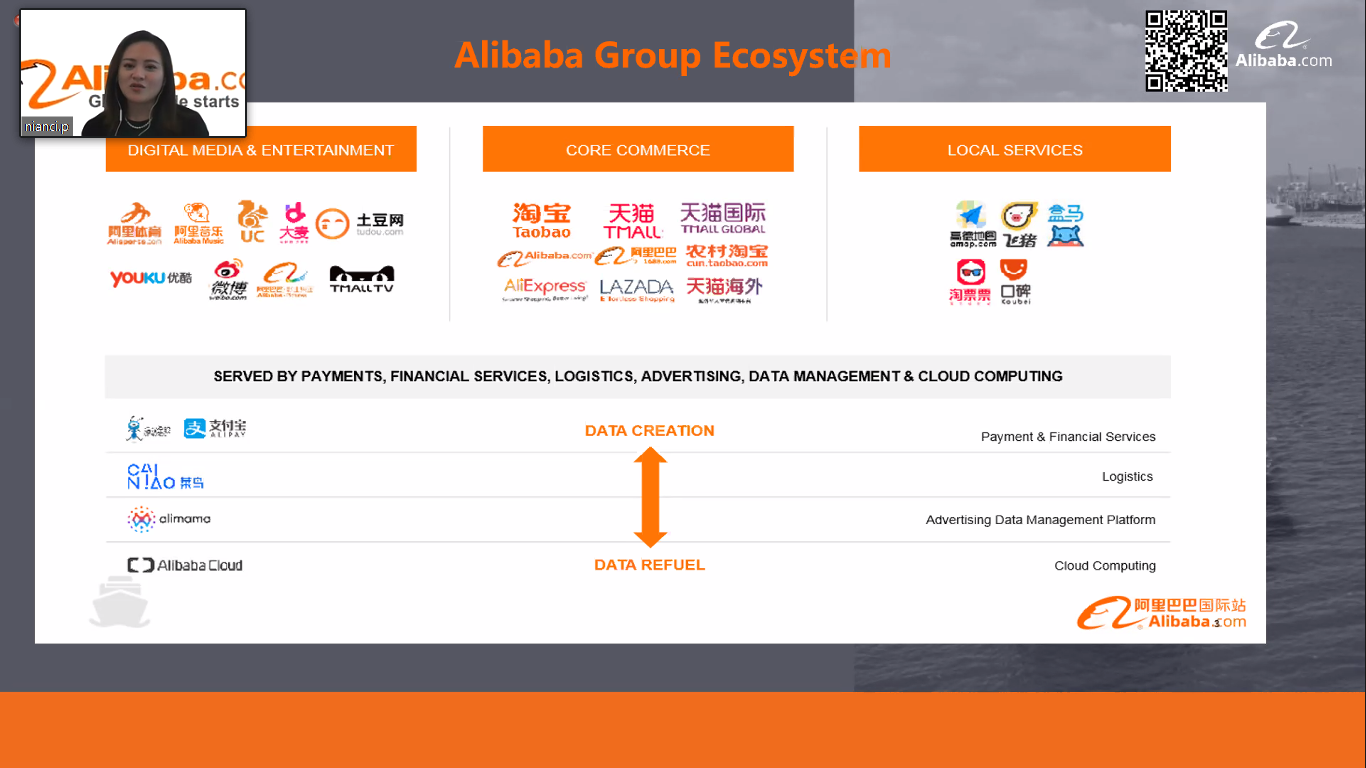
Nianci Phang showing Alibaba’s core businesses
Nianci Phang
moved on to explain Alibaba’s digital evolution since its inception. “When
Jack Ma first founded Alibaba, it was only a listing B2B platform where
businesses could only exchange information with each other if they wanted to
deal with one another. Years later, Alibaba 2.0 was conceptualised to become
a trading platform where comprehensive foreign investors trade services such
as meeting potential buyers, drafting order, receiving payments and shipping
orders. Finally, we have the present Alibaba 3.0, a digital platform
offering digital marketing solutions and allowing businesses and consumers
to find the specific products that they desire,” said Nianci Phang. She also
enlightened the participants on Alibaba’s e-commerce growth since 2018.
These thought-provoking statistics speak for themselves, as it showed that
Alibaba has had a 50% growth in active buyers, a massive 65% increase in the
number of paying buyers, and a whopping 160% rise in their transactions in
2020 alone.
Nianci Phang
progressed the webinar, focusing on her second topic, which was the impact
of Covid-19 on online B2B traffic and buyers’ behaviour. She shared the
statistics of Alibaba’s online global traffic during and after the Covid-19
outbreak, plus the rate in which online global buyers are getting younger.
She also gave the attendees an insight into the global home and health
industry, which was listed as the most popular online purchased products by
people at home during the pandemic. Nianci Phang stated, “During the
epidemic, lots of household furniture like chairs and lamps were purchased
because of the amount of time spent at home. Not just that, the amount of
manufacturing materials bought has also increased. Consumers are also in a
relaxed state at home, so comfort and casual wear were prioritised. They
have been buying more home-wear clothing. Cleaning and personal care
products, such as makeup and detergents were also purchased frequently,
which reflects the customers’ pursuit for health and well-being.
Families with children are the main consumers for sports and
entertainment products, since they need to keep their kids busy with toys.
Last but not least, every household has been stocking up on food as
preparation for the pandemic.”
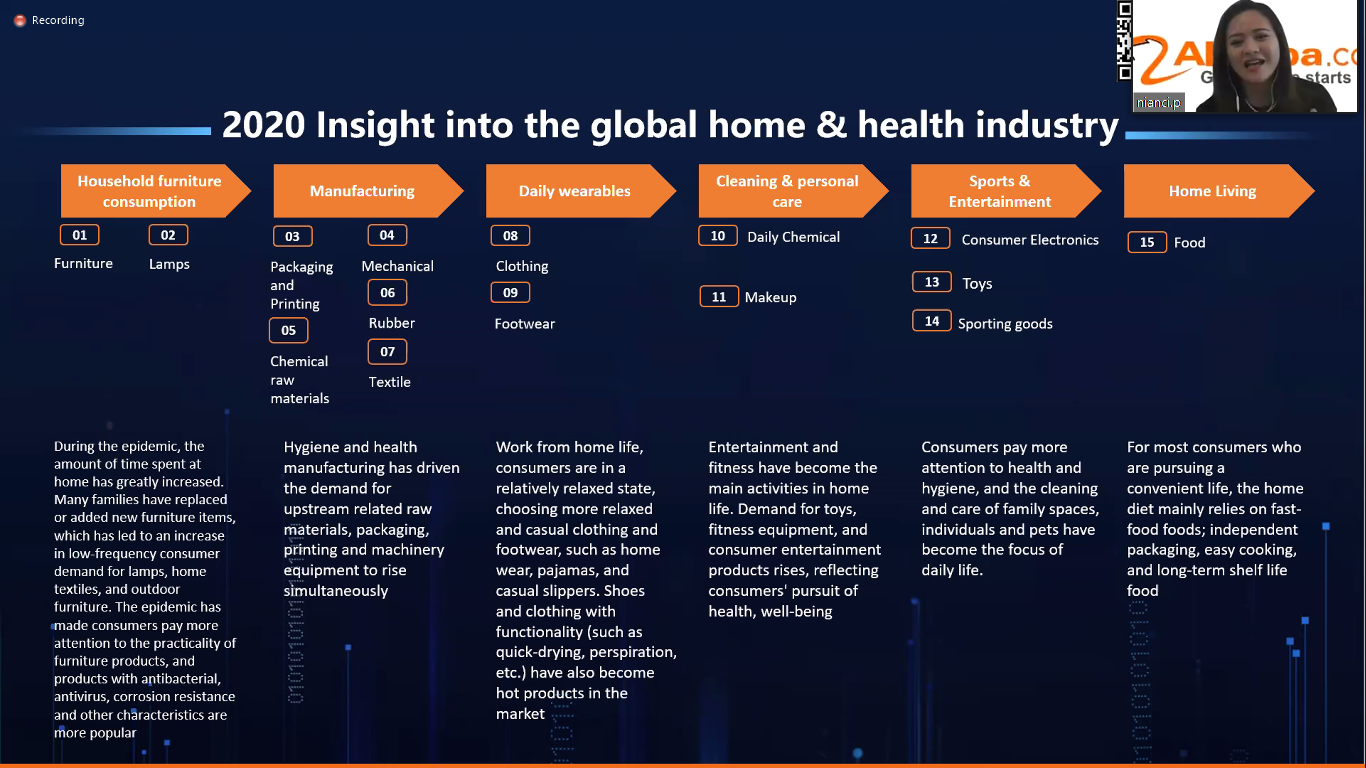
Nianci Phang giving an insight into the home and health industry
To end the
first hour of the webinar, she enlightened the participants on Alibaba’s
current solutions for Malaysian SMEs to compete in the digital world. For
this, Nianci Phang introduced the Alibaba Global Gold Supplier Membership
(GGS). In essence, it is a premium membership account for SMEs who will
receive several unique functions such as their own distinct storefront,
increased exposure, data-driven marketing schemes and wider business
opportunities. She also mentioned that those SMEs can get a few benefits
from having a gold account instead of a normal, basic account. These
benefits include differentiation from the competition, international brand
recognition because of Alibaba’s globally known reputation, and the ability
to create trust easily due to having a verified account. Nianci Phang
ultimately ended her part by advertising Alibaba’s Super September sale.
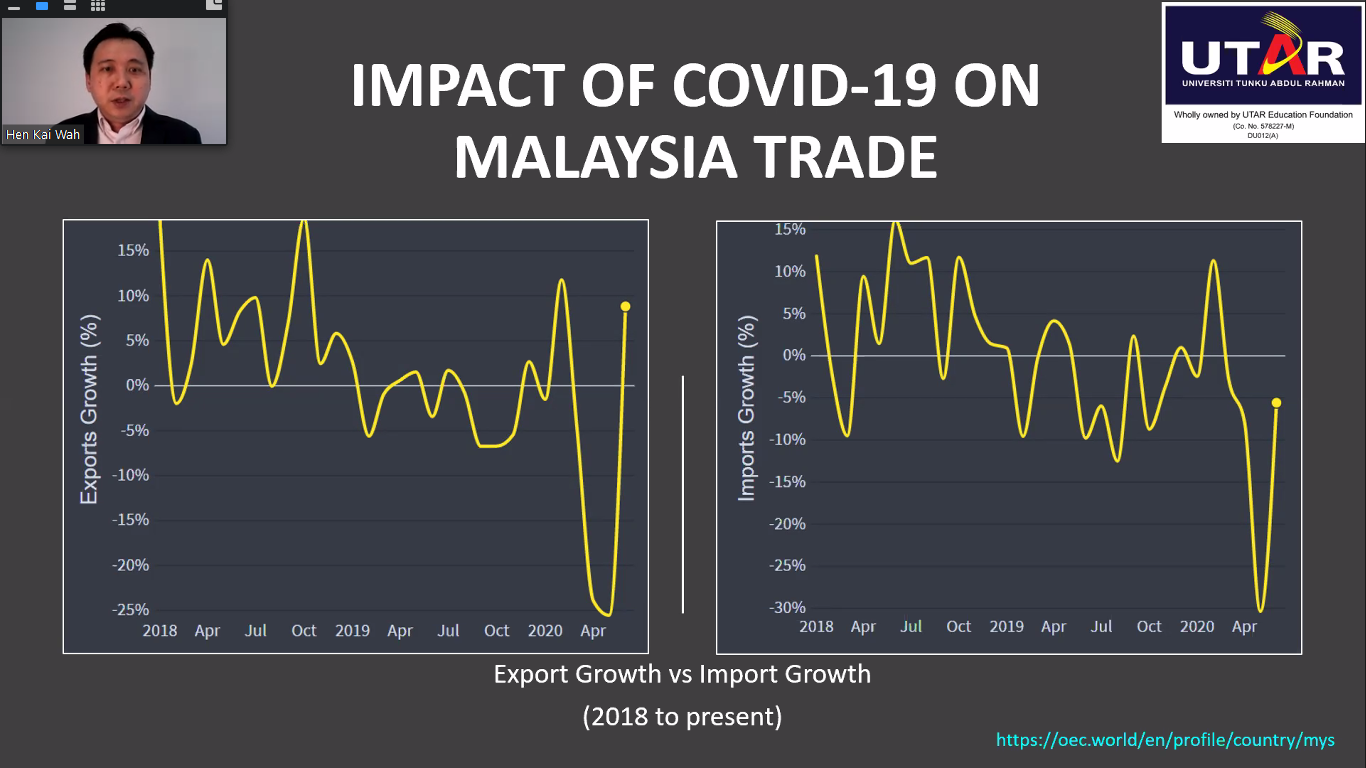
Dr Hen explaining Malaysia’s export and import growth
Dr Hen
continued the talk by analysing cross-border e-commerce also known as
international online trade. It consists of the selling or purchasing of
products via online shops across national borders. After sharing a few
statistics detailing the growth of Malaysia’s cross-border e-commerce market
and Malaysian cross-border e-commerce shopping frequency and motivation, he
focused on the other side of the coin, which is about the cross-border
e-commerce for sellers instead. According to Dr Hen, there are five
advantages of cross-border e-commerce for sellers; a global reach, wider
engagement, increased revenue, better opportunity to seize the potential of
different product ranges, and a highly competitive market.
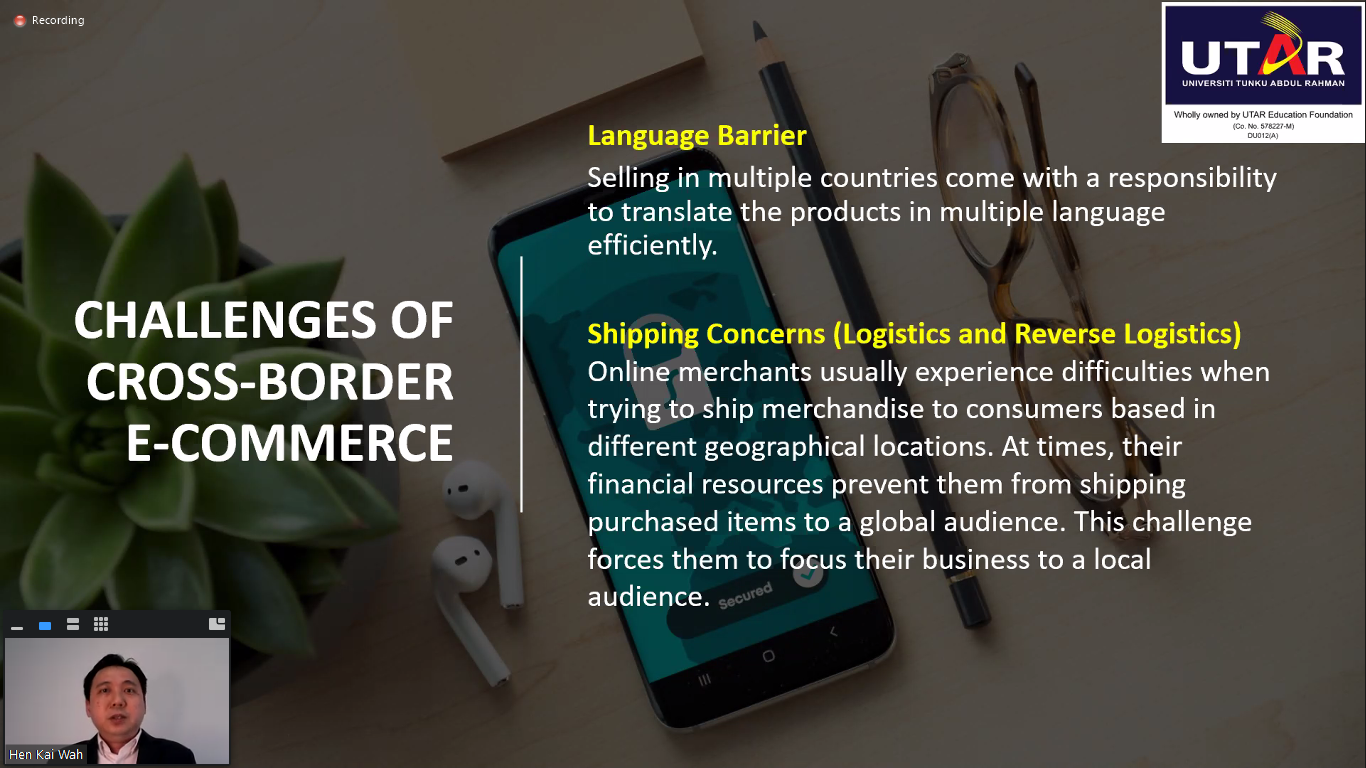
Dr Hen discussing the challenges of cross-border e-commerce
Dr Hen ended his presentation by briefly addressing the following topics; the six thrust areas of the National e-commerce strategic roadmap, the 12 programmes of the said strategic roadmap, Malaysia’s Digital Free Trade Zone (DFTZ), and the power of social media influencers in e-commerce.
The talk was
concluded with an extensive yet insightful Q&A session.
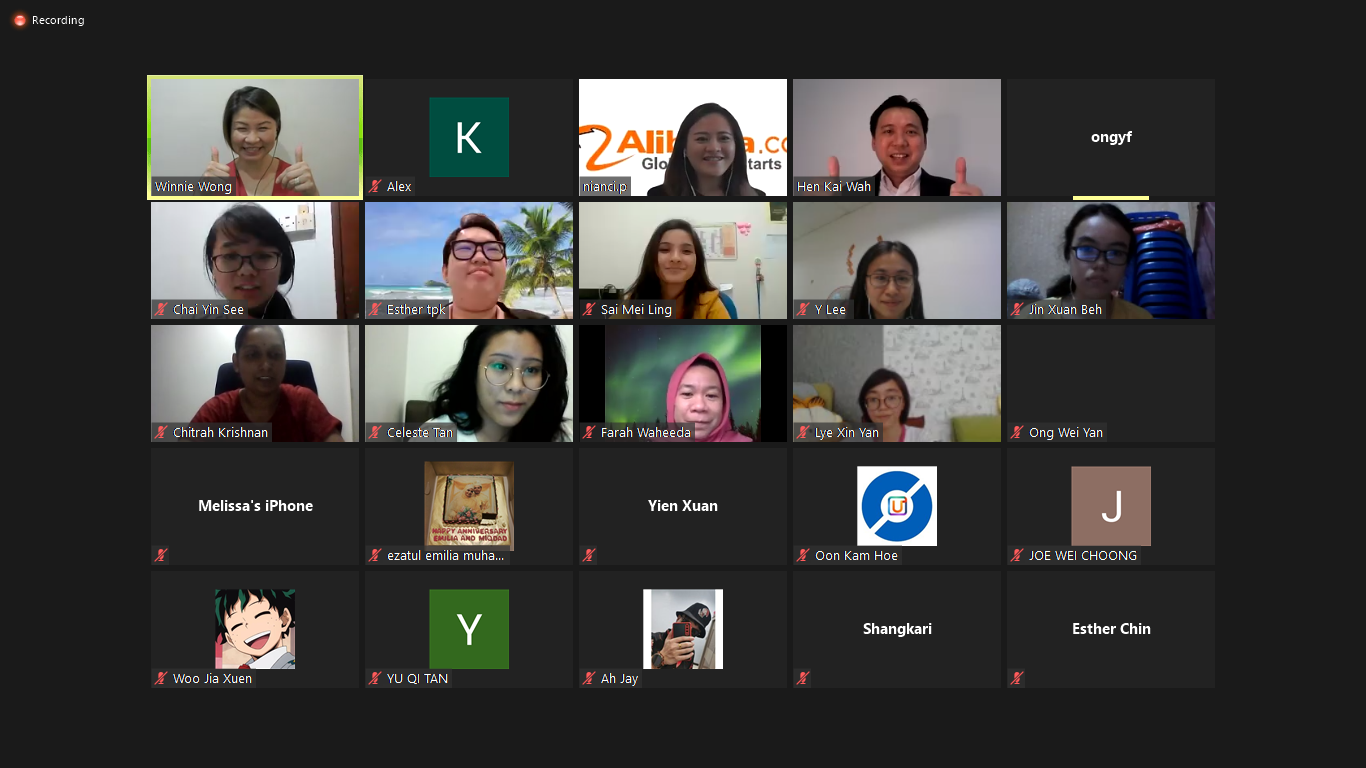
![]()
![]()
Wholly owned by UTAR Education Foundation Co. No. 578227-M LEGAL STATEMENT TERM OF USAGE PRIVACY NOTICE